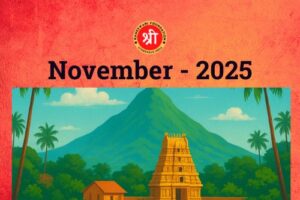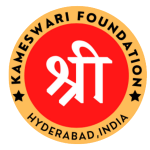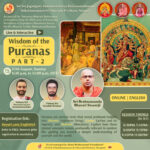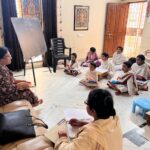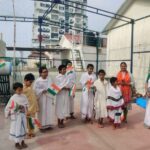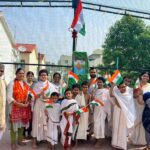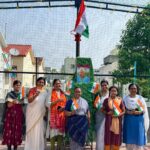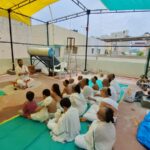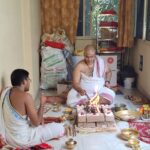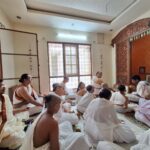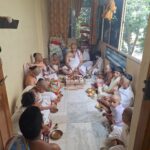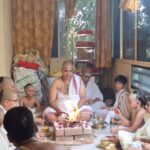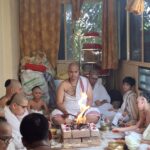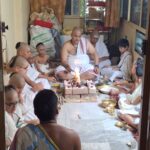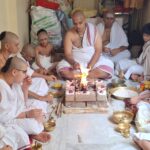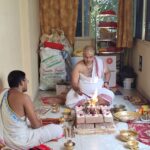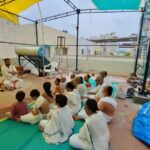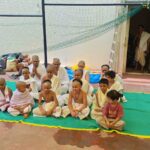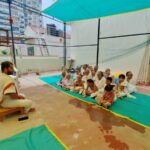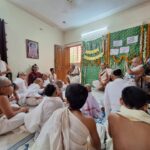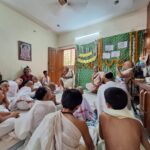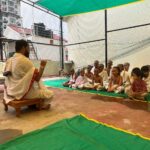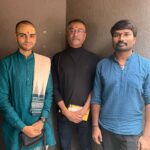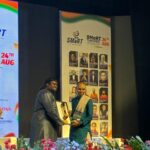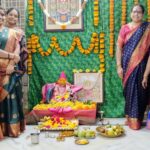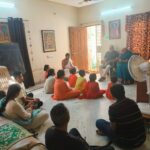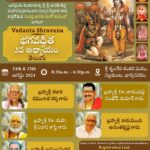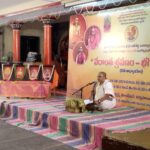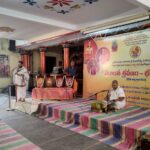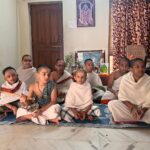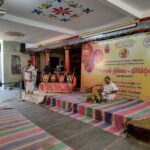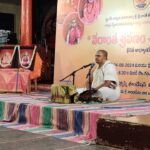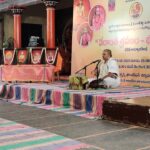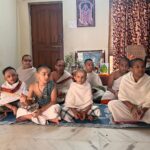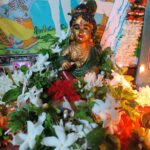
Monthly Highlights – August 24
- Posted by Sri Kameswari Foundation
- Date August 27, 2024
- Comments 0 comment
1. Acharya, Jammalamadaka Suryanarayana Garu, had the honor of being one of the speakers at the event ‘Wisdom of the Puranas – Part 2’, organized by Sri Sri Jagadguru Shankaracharya Mahasamsthanam Dakshinamnaya Sri Sharada Peetham, alongside other eminent Acharyas.
He spoke about the relevance of the basic principles of life—Dharma and Karma—in contemporary times and how they guide us toward the ultimate aim of life, liberation, by drawing from our great knowledge sources, the Puranas.
We express our sincere gratitude to Sri Sharada Peetham and the Jagadgurus for blessing us with this wonderful opportunity.
2.We are very happy to have Dr. Anuradha Udumudi Garu at our Veda Pathashala to teach simple concepts of biology to our students.
Dr.Anuradha Udumudi (Doctorate in Human Genetics) founded GeneTech in 1998, pioneering medical genetics services in India, as the only independent medical genetics laboratory offering most comprehensive genetics testing services.
For more information, please visit: https://genetech.co.in/founders-profile/
It is truly a blessing for our students to learn from her, an opportunity rarely available to children at such an early age.
Along with this, the children were taught about design thinking, history and presentation skills.
3.With the grace of the Goddess, we were able to have a new stadium constructed on our Pathashala premises for the kids to play.
An even more joyful thing to share is that the stadium was inaugurated with a flag hoisting on our 78th Independence Day!
4. Our Acharya, Jammalamadaka Srinivas Garu, has been creating a series of videos as part of the ‘Bṛhadmrdaṅga Utsava’ in collaboration with Bṛhat, where he explains the significance of our festivals and rituals from a shastric perspective.
This month, he spoke about the following:
i) The origins and significance of Rakshabandhan and the power that resides in the intention to protect – https://www.youtube.com/watch?v=zNsqaZtZnqk&t=2s
ii) The significance and implications of Upākarma, along with the adhikāritva to chant the sacred Gāyatrī mantra – https://www.youtube.com/watch?v=NfVpQ9urRD4
5. Shravana Purnima – Upakarma
Upakarma is an important ritual in the Vedic tradition, especially for students and teachers. The word “Upakarma” comes from Sanskrit, where “Upa” means “near” or “beginning,” and “Karma” means “action.” So, Upakarma literally means “starting an action” or “new beginning.” This ritual marks the renewal and fresh start of studying the Vedas, the ancient sacred texts of Hinduism.
Let’s explore the key aspects of Upakarma in simple terms:
Renewal of Vedic Studies:
Upakarma is celebrated every year to restart the learning or Upadesha of Veda mantras on Shravana Purnima. It is a way to recommit oneself to studying and understanding these sacred texts.
Before beginning anew, people perform cleansing rituals to purify their mind and body. This preparation helps them receive and retain the sacred knowledge with clarity and devotion.
Rishi Tarpana:
Rishi Tarpana is a special part of Upakarma where people offer respect and gratitude to the ancient sages, known as Kanda Rishis. These sages are believed to have heard and passed down the wisdom of the Vedas.
New Yagyopavita (Sacred Thread)
The Yagyopavita, or sacred thread, is an important symbol in Hinduism representing knowledge and responsibility. On Upakarma, people replace their old thread with a new one.
Putting on a new sacred thread signifies renewing one’s commitment to learning, righteousness, and leading a disciplined life according to Vedic principles.
Sri Kameswari family gathered to celebrate the festivities associated with Shravana Purnima.
6.On 24th August, a vibrant literary festival was held in Bengaluru, organized by Smart and supported by prominent nationalist organizations such as the Siddhanta Knowledge Foundation. The event brought together several influential figures from the nationalistic social media sphere, including Sandeep Balakrishnan, String Vinod, IndiaTales’ Anuradha, and Shehzad Poonawala, among others.
One of the highlights of the festival was a thought-provoking panel discussion led by our Acharya – Dr. Jammlamadaka Suryanaraya, which focused on the development of a curriculum based on Bharatiya knowledge systems, also known as Shastras. The discussion emphasized the need to integrate these ancient wisdom traditions at all levels of education.
At the primary level, the proposed curriculum would encourage students to actively participate in cultural festivals and take on responsibilities, fostering a sense of involvement and community. As students progress to middle school, the focus would shift to introducing them to the theory of higher goals in life and the concept of higher alignment, helping them understand the deeper purposes of existence.
For college students, the curriculum would aim to demonstrate the practical applicability of Shastras in solving contemporary problems, bridging the gap between ancient wisdom and modern challenges. Finally, at the university level, students would be encouraged to engage in research that focuses on problem-solving through the lens of Shastras, promoting innovative approaches grounded in Bharatiya traditions.
This festival not only celebrated literary achievements but also sparked important conversations about how traditional Indian knowledge systems can be revitalized and integrated into modern education.
7.Acharya Dr. Jammalamadaka Srinivas participated in the discourse panel on the Bhagavad Gita—2nd Chapter (Telugu), a spiritual event organized by Sri Sri Jagadguru Shankaracharya Mahasamsthanam Dakshinamnaya Sri Sharada Peetham, alongside other eminent Acharyas. The event took place on the 24th and 25th of August.
We are deeply grateful to Sri Sharada Peetham and the Jagadgurus for bestowing this remarkable opportunity upon us.
8.Krishnashtami celebrations were held at our Veda Pathashala, where students offered prayers to Lord Krishna, followed by a Mangalaharathi. Acharya J. Suryanarayana Garu then spoke to the students about the lessons to be learned from the life of Sri Krishna, particularly on how to conduct ourselves in society.
Related pictures have been shared in the gallery.
You may also like
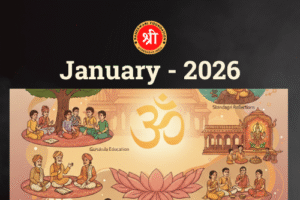
Monthly Highlights – January 26

Monthly Highlights – December 25
